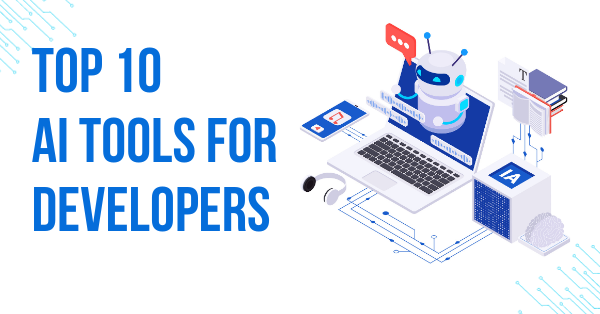Top 10 AI Tools for Developers

Sr.no | Tools for Developers | Website Link |
|---|---|---|
1 | TensorFlow | |
2 | PyTorch | |
3 | Scikit-learn | |
4 | Replit | |
5 | TabNine | |
6 | Amazon CodeGuru | |
7 | Enzyme | |
8 | GitHub Copilot | |
9 | Cucumber | |
10 | Apache MXNET |
1. TensorFlow

2. PyTorch

PyTorch is an open-source deep learning framework developed by Facebook’s AI Research lab (FAIR). It has gained substantial popularity among researchers, developers, and data scientists due to its flexibility, dynamic computation graph, and ease of use.
PyTorch uses a dynamic computation graph, the graph is created as operations are carried out. In comparison with static computation graphs used in some other frameworks, this makes it simpler to troubleshoot and experiment with models.
With numerous applications like computer vision, natural language processing, speech recognition, recommendation systems, and more, TensorFlow is utilized extensively in both academics and industry. Its widespread use in the machine learning and artificial intelligence fields can be attributed to its adaptability, scalability, and robust community support.
PyTorch is particularly popular in the research community due to its dynamic graph and easy experimentation capabilities. Its user-friendly interface and extensive documentation make it accessible to both beginners and experienced practitioners in the field of deep learning and artificial intelligence.
3. Scikit-learn

Scikit-learn is an open-source machine learning library for Python that provides simple and efficient tools for data analysis and modeling. It is built on top of other popular Python libraries such as NumPy, SciPy, and matplotlib, and it is widely used by data scientists and machine learning practitioners for various tasks.
To make it simple to transition between various models and methods, scikit-learn provides a consistent and user-friendly API for a variety of machine learning algorithms.
Scikit-learn provides tools for choosing models and evaluating them, including cross-validation, hyperparameter adjustment, and multiple metrics for judging model performance.
To effectively handle huge datasets, some scikit-learn algorithms can be distributed over numerous processors or machines or run in parallel.
Cross-Platform: It works on Windows, macOS, and Linux and is compatible with many different operating systems.
Scikit-learn is a valuable tool for both beginners and experienced data scientists for developing machine learning models, conducting experiments, and gaining insights from data. Its versatility and ease of use make it a go-to library for many machine learning tasks in Python.
4.Replit

Replit is an online development platform that provides a cloud-based environment for coding, collaborating with others, and running code directly in the browser. It’s a versatile platform that supports a wide range of programming languages, making it popular among developers, students, and educators for various purposes.
For several programming languages, including Python, JavaScript, Java, C++, and more, Replit provides a web-based code editor with syntax highlighting and autocompletion. Within the platform, you can write, edit, and execute your code.
Replit supports real-time collaboration, allowing multiple users to work on the same project simultaneously. It’s useful for pair programming or group projects where team members can edit and review code together.
Replit provides an interactive shell for languages like Python, allowing you to run code line-by-line and see immediate results.
Replit is designed to be accessible and user-friendly, making it a great choice for beginners and experienced developers alike. It eliminates the need for complex local development setups and allows you to focus on coding and collaboration.
5. TabNine

TabNine is an AI-powered code completion and code suggestion tool designed to boost developer productivity. It uses machine learning models to provide intelligent code completions and suggestions as you write code in your integrated development environment (IDE) or code editor.
To provide context-aware code completions, TabNine combines machine learning algorithms and predictive typing. Based on the context of your code, it can anticipate variable and function names, entire lines of code, and more.
TabNine supports a wide range of programming languages, including Python, JavaScript, Java, C++, and many others, making it suitable for developers working in different domains.
The suggestions that come from TabNine can be modified by developers to fit their coding tastes and style. You can set it up to prioritize particular kinds of completions or to recommend particular patterns.
TabNine is intended to save developers time by reducing repetitive typing and assisting with code generation. It can be a valuable productivity tool, especially for programmers working on complex projects or in languages where code suggestions are particularly beneficial.
6. Amazon CodeGuru

Amazon CodeGuru is a set of developer tools and services offered by Amazon Web Services (AWS) that leverages machine learning to help developers improve the quality of their code and optimize application performance.
CodeGuru Reviewer automatically reviews code and identifies coding problems, security flaws, and violations of best practices using machine learning models.
CodeGuru Reviewer can be integrated with pull request workflows, providing feedback to developers during code reviews.
By showing which sections of the code are utilising the most resources (CPU, memory, etc.), CodeGuru Profiler helps developers in understanding the behavior of their applications during runtime.
CodeGuru is primarily designed for cloud-native applications hosted on AWS, and its effectiveness may vary depending on the specific use case and programming language. Developers interested in using CodeGuru can take advantage of its free tier for initial evaluation and then choose a suitable pricing plan based on their needs.
7. Enzyme

Enzyme is a JavaScript testing utility for React applications. It is commonly used in conjunction with testing frameworks like Jest to facilitate the testing of React components’ behavior and interactions in a virtual DOM environment.
Enzyme provides a set of helper functions for interacting with and inspecting React components during testing.
You may test various element states and scenarios using Enzyme’s methods for examining and changing component state and features.
Enzyme can be used in conjunction with Jest’s snapshot testing functionality to record and compare component renderings, assisting in the discovery of unintentional changes in component output.
Enzyme’s comprehensive documentation and welcoming developer community make it simpler for users to begin with React component testing.
Enzyme is a valuable tool for React developers who want to ensure the correctness and robustness of their components. Enzyme helps in developing more dependable React applications by examining component behavior and simulating user interactions to identify problems early in the development cycle.
8. GitHub Copilot

GitHub Copilot is a collaborative coding assistant developed by GitHub in partnership with OpenAI. GitHub Copilot is designed to assist developers by providing code suggestions, autocompletions, and even generating entire code blocks based on the context of their code.
GitHub Copilot can understand and produce code based on comments and explanations in natural language. It will try to generate the code in accordance with what you say in plain English when describing what you want your code to perform.
GitHub Copilot is adaptable for a variety of development activities because it supports many programming languages and frameworks.
GitHub Copilot can generate test cases and testing code, helping you with test-driven development (TDD) practices.
9. Cucumber
Cucumber is an open-source testing framework that supports behavior-driven development (BDD). It is commonly used for automating acceptance tests for web applications. Cucumber allows developers, testers, and non-technical stakeholders to collaborate and define application behavior using plain text specifications, which can be easily understood by all parties involved.
Cucumber encourages collaboration among developers, testers, product owners, and other stakeholders by providing a common language for discussing and documenting application behavior.
Cucumber scenarios are associated with step definitions, which are written in programming languages like Ruby, Java, JavaScript, or Python. These step definitions define the actual actions that should be taken for each step in a scenario.
Cucumber has a vibrant community and a rich ecosystem of plugins and integrations, extending its capabilities and making it adaptable to various testing needs.
Cucumber is often used for end-to-end and acceptance testing, where the focus is on verifying that the application behaves correctly from a user’s perspective. It is particularly popular in agile development environments where collaboration and communication between teams are essential for delivering high-quality software.
10. Apache MXNET
Apache MXNET is designed for training and deploying deep neural networks and is suitable for a wide range of machine learning and deep learning tasks.
MXNet is renowned for being adaptable and effective. It provides both imperative and symbolic programming, allowing users to select the strategy that will work best for their own requirements. It is appropriate for both research and production situations because of its flexibility.
MXNet provides official APIs and support for multiple programming languages, including Python, Scala, Julia, and R, making it accessible to a wide range of developers.
Users may spread their deep learning workloads across many GPUs and machines because of MXNet’s support for distributed training. This is essential for effectively training big models on big datasets.
MXNet’s hybrid frontend combines the benefits of both symbolic and imperative programming. Users can define their neural network architectures using a symbolic interface and then execute them imperatively.
Apache MXNet is widely used in both research and industry settings for a variety of deep learning tasks, including image recognition, natural language processing, speech recognition, and more. Its flexibility, efficiency, and scalability make it a valuable tool for developers and data scientists working with deep learning models.






















